

G. Stanley Hall, the first president of the American Psychological Association (APA), even described adolescence as a period of 'storm and stress'.
In this topic, we will be able to look into the triggers and sources of stress that exist in adolescence as well as effective strategies that they can adopt to cope with stress. This would include ways that adolescents can self-manage and ways people around them, such as parents, teachers or friends, can assist in their management.
6 Common Triggers of Teen Stress. Triggers of stress in adolescence. Stress May Trigger Mental Illness and Depression In Teens - Depression Center - EverydayHealth.com.
Your teenage years should be among the best times of your life.
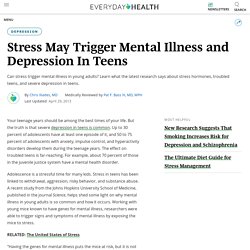
But the truth is that severe depression in teens is common. Up to 30 percent of adolescents have at least one episode of it, and 50 to 75 percent of adolescents with anxiety, impulse control, and hyperactivity disorders develop them during the teenage years. The effect on troubled teens is far-reaching. For example, about 70 percent of those in the juvenile justice system have a mental health disorder. Adolescence is a stressful time for many kids. RELATED: The United States of Stress "Having the genes for mental illness puts the mice at risk, but it is not enough to cause mental illness," says Akira Sawa, MD, PhD, a psychiatry professor and director of the schizophrenia center at Johns Hopkins Medical Center in Baltimore and lead researcher on the study.
How Stress Triggers Mental Illness in Young Adults "I think most clinicians would agree that adolescent stress can cause major changes in adult brains," Dr. School Stress Takes A Toll On Health, Teens And ... - NPR. Adolescent mental health. Introduction Adolescence (10–19 years) is a unique and formative time.
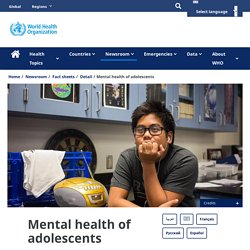
Multiple physical, emotional and social changes, including exposure to poverty, abuse, or violence, can make adolescents vulnerable to mental health problems. Promoting psychological well-being and protecting adolescents from adverse experiences and risk factors that may impact their potential to thrive are critical for their well-being during adolescence and for their physical and mental health in adulthood. Mental health determinants. Negative impacts of stress in adolescence. Coping Strategies. Avoidance and Approach coping. How to help children and teens manage their stress. In the short term, stress can push a child to practice for her piano recital or inspire a teen to study when he’d rather be out with friends.
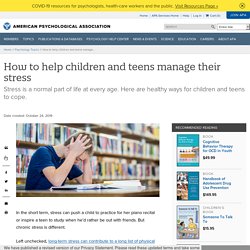
But chronic stress is different. Left unchecked, long-term stress can contribute to a long list of physical and mental health problems. Prolonged stress can cause high blood pressure, weaken the immune system and contribute to diseases such as obesity and heart disease. It can also lead to mental health problems such as anxiety and depression—disorders that are becoming more common in youth.
In a 2018 study, researchers analyzed data from the National Survey of Mental Health and found that rates of anxiety and depression had increased in kids ages 6 to 17, from 5.4% in 2003 to 8.4% in 2011-12. Managing Stress in Teens and Adolescents: A Guide for Parents. Teen stress is an important health issue.
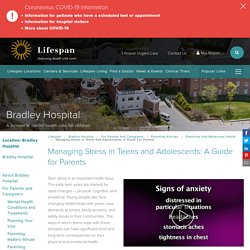
The early teen years are marked by rapid changes — physical, cognitive, and emotional. Young people also face changing relationships with peers, new demands at school, family tensions, and safety issues in their communities. Signs of stress in adolescence. Stress-management strategies for adolescents. Ways parents can support adolescence stress. Personal plan handout. Personal Plan to manage stress. How to Relieve Stress: A 6-Step Plan to Feeling Good. “Experiencing stress is inevitable, but managed well, stress can promote emotional and intellectual growth and resilience as we age,” says Johns Hopkin stress management expert Frances Callahan, LCSW-C.
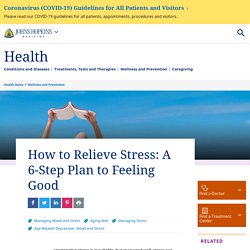
She has mapped an easy-to-follow plan for how to manage stress—at any age. Identify your triggers. Once you know where your stress is coming from—a relationship, kids, workload, a health problem—you can sometimes reduce or prevent the stress. After giving the matter some focused thought, you may identify practical steps to improve the situation. Even if changing the trigger isn’t possible, a shift in perspective may help mitigate stress. Stay connected. Maintaining, improving, and increasing healthy relationships with supportive friends and family powerfully promotes resilience. Resources for mental health professionals. A self-care plan can help you enhance your health and wellbeing, manage your stress, and maintain professionalism as a worker with young people.

Learn to identify activities and practices that support your wellbeing as a professional and help you to sustain positive self-care in the long-term. Aspects of self-care Self-care is a personal matter. Everyone’s approach will be different. It relates to what you do at work and outside of work to look after your holistic wellbeing so that you can meet your personal and professional commitments (find out more).
Workplace or professional Physical Psychological Emotional Spiritual Relationships. NOTE: The activities and suggestions below are a guide only and it is important to choose activities that are meaningful to yourself and your own goals. After discovering the different aspects of self-care, complete the self-care plan activity below. Workplace or professional self-care Physical self-care Develop a regular sleep routine. The Power of Positive Talking - WebMD. Franco Beneduce, certified life coach and group facilitator, San Francisco, Calif.

Harker, L. Journal of Personality and Social Psychology, January 2001. Lyubomirsky S. Emotion, April 2011. Lyubomirsky, S. Sonja Lyubomirsky, PhD, professor of psychology, University of California, Riverside. Self-Talk: Why It Matters. Take a minute and think about what you’ve said to yourself today.
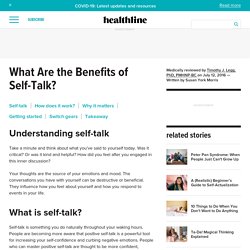
Was it critical? Or was it kind and helpful? How did you feel after you engaged in this inner discussion? Your thoughts are the source of your emotions and mood. The conversations you have with yourself can be destructive or beneficial. Self-talk is something you do naturally throughout your waking hours. Importance of positive self-talks. Use Coping Self-Talk to Reduce Worry and Stress. By Allen Elkin Changing your self-talk is one great way to reduce stress caused by chronic worry.
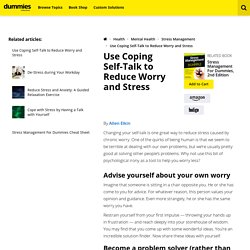
One of the quirks of being human is that we seem to be terrible at dealing with our own problems, but we’re usually pretty good at solving other people’s problems. Why not use this bit of psychological irony as a tool to help you worry less? Advise yourself about your own worry Imagine that someone is sitting in a chair opposite you. Restrain yourself from your first impulse — throwing your hands up in frustration — and reach deeply into your storehouse of wisdom. Become a problem solver (rather than a worrier) How to Use Positive Affirmations for Stress Relief. Positive affirmations are a great tool for reprogramming your unconscious mind from negative thinking to positive.

The idea is to take positive statements of what you would like to see manifested and repeat them enough so that they’re part of your way of thinking and seeing the world. Positive affirmations work the same way that negative self-talk does but in a way that benefits you. Using self-talks to manage stress. 5 Relaxation Exercises that Relieve Teens' Stress. You might think your teen doesn't have much stress in her life. After all, she doesn't have to pay the bills, work a full-time job, or manage a busy household.
But the truth is, today's teens are stressed out. In fact, the 2014 Stress in America survey found that teens are experiencing even more stress than adults. They're worried about school, their friends, romantic relationships, money, and their futures. Some of them are dealing with even bigger issues, like bullying and depression. Sadly, stressed-out teens are turning to unhealthy coping mechanisms to deal with their overwhelming feelings. Teen Stress Can Be Reduced With Simple Breathing Technique. Top 5 Quick And Easy Relaxation Techniques For Teens. Is your teen unusually surly? Is her performance at school gradually degrading? Is she having trouble dealing with the daily stresses of life? If yes, then what she needs is to relax a bit!
Being a teenager is not easy. Dealing with physical changes and raging hormones is no “child’s” play. Relaxation Exercises/Mindfulness.